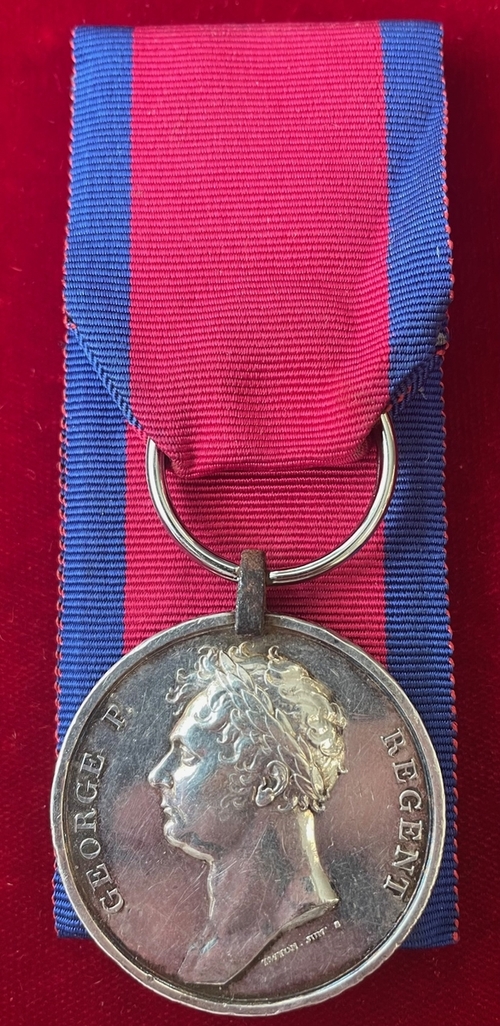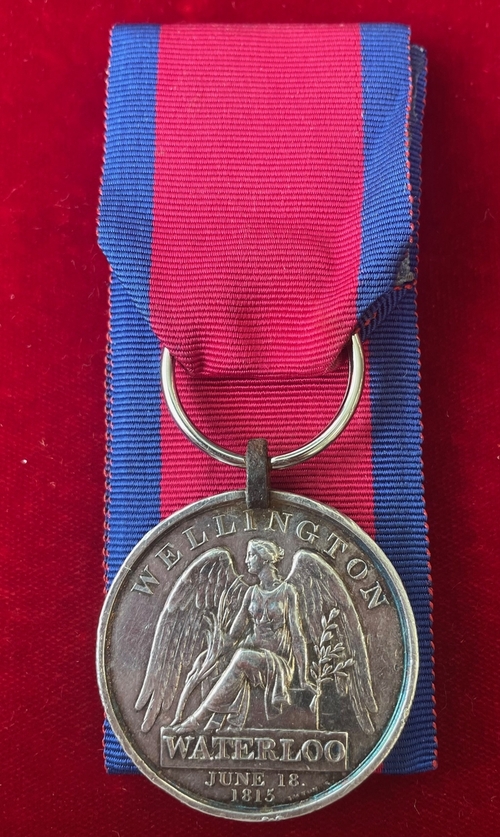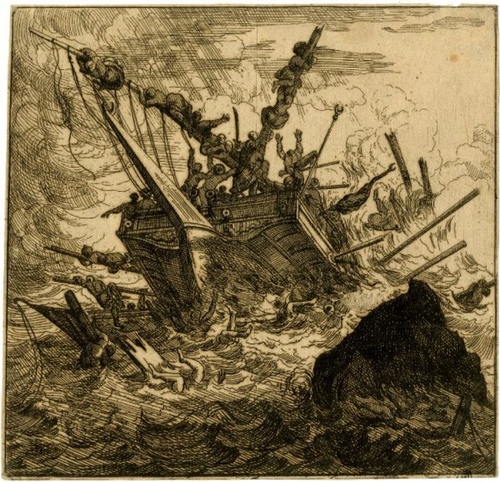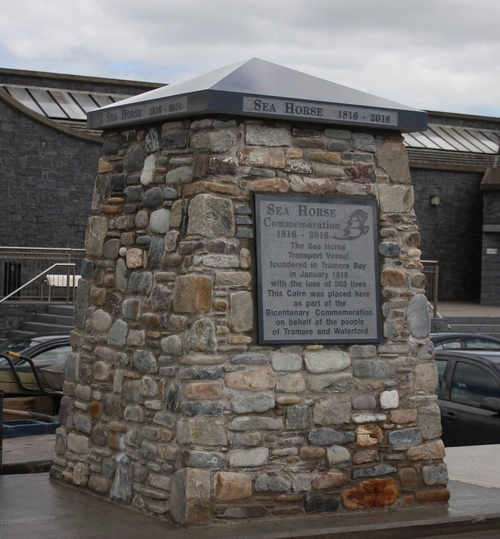Auction: 25002 - Orders, Decorations and Medals
Lot: 13
'A French Regiment would not have conducted itself with as much propriety as the 59th'
An emotive Waterloo Medal awarded to Private E. Pickston, 2nd Battalion, 59th Foot, who miraculously survived 'Ireland's Worst Maritime Disaster' with the wrecking of the Sea-Horse, Lord Melville and Boadicea, that claimed the lives of 510 of his comrades in Tramore Bay, near Waterford, Ireland, on 30 January 1816
Waterloo 1815 (Edward Pickston 2nd Batt. 59th Reg. Foot.) with original steel clip and modern replacement split ring suspension, lightly polished with residual tone and minor edge bruises, very fine or better
Provenance:
Glendining's, 27 April 1911.
Edward Pickstone attested for the 59th (2nd Nottinghamshire) Regiment of Foot and served with the 2nd Battalion in Captain Andrew Mancor's Company during the Waterloo campaign. His name appears as no. 104 on the Medal Roll, one of fifty-six men under Mancor's command for the Campaign.
Raised in 1806, the Battalion was garrisoned in Ireland until 1814, when they were called up as a contingent of the Allied Army of Occupation in Paris. After Napoleon’s escape from Elba, the 2/59th were present in Reserve for the 18th June. J J McGregor (A Short Sketch of the Distinguished Services of these Gallant Corps while under the command of His Grace, the Duke of Wellington, Waterford, 1816, refers.) picks up our tale:
'The 59th returned to Ireland with many other corps of Lord Wellington’s army, and in this country they remained till the unexpected return of Bonaparte from Elba again disturbed the repose of Europe, and excited gloomy apprehensions, that the scourge of war might yet for a long time desolate the nations. This event called for their services once more under the hero who had so often led them to victory, and they accordingly embarked at Warren’s Point, near Newry, for England, and after a short stay at Dover, sailed for the Low Countries in May 1815.
They remained in garrison at Oudenarde till the eve of the glorious battle of Waterloo, so justly termed the Thermopylae of Europe. The protection of the great road leading to Brussels through Halle was entrusted to the division of General Colville, composed of the 14th, 23d, 35th, 51st, 54th, 59th and 91st regiments, with a corps of Hanoverians, but it did not fall to their lot to be seriously engaged, though menaced through the whole of the 18th of June by 5,000 French Cavalry, till the remainder of the enemy’s army was put to flight. Had it fallen to their lot to be attacked, they would without doubt, have displayed equal valour with their brave comrades in other quarters of the field on that ever memorable day.
General Colville’s division now became the advanced-guard, crossing the French frontier near Cateau on the 22d, and storming Cambray with the greatest gallantry on the 24th, whence the whole army pursued its route for Paris, which speedily surrendered to the Allied Forces. From that period the 59th lay encamped for four months in the Bois-de-Boulogne, and were afterwards quartered at Montlhéry, near the French capital, till the 6th of December, when the Definitive Treaty having been signed, they marched for Calais, and a few days after landed in England.'
An amusing anecdote survives of their billet, courtesy of the Mayor:
'This corps was always as remarkable for good conduct as a garrison as for bravery in the field. During the residence of the Prussians at Montlery, the inhabitants had carefully concealed their plate and other valuable effects, but on the arrival of the 59th, they were observed digging them up without apprehension from the ground where they were buried. The greatest respect and attention were paid both to the officers and men while they remained, and on their departure the regret of the Mayor and principal Citizens was manifested in a handsome complimentary address in which it was declared, “that a French regiment would not have conducted itself with as much propriety as the 59th.'
In January 1816, the Battalion embarked on charter ships the Sea Horse and Lord Melville for return to barracks in Ireland. Five companies, 16 officers and 287 men, embarked on Sea Horse along with 33 women and 8 children. Meanwhile, the Lord Melville, a larger vessel of 351 tons, carried the remainder of the Battalion, including Mancor's Company.
The vessels sailed to the Downs on 25 January 1816, where they were joined by the brig Boadicea carrying 290 troops, and 34 women and children of the 82nd Regiment of Foot (Prince of Wales's Volunteers). The ships headed west along the English Channel and entered the Irish Sea at 5pm on 28 January. Weather had been deteriorating throughout the day, but worse was to follow.
At 4pm on 29th, Sea Horse's mate, John Sullivan, the only member of that crew familiar with the Irish coast around Cork, fell from the foremast and was fatally injured. Captain Gibbs was then unable to locate the Kinsale lights through the howling gale. The following morning, Sea Horse attempted to reach the sanctuary of Waterford harbour, but at 10:30am her foretop was brought down. The crew sought to prevent the ship from being driven further onto the north arm of Tramore Bay by releasing her three anchors, but the sea soon broke over her rigging, and by noon her anchors were dragging. Helpless, the mizzen and main mast were jettisoned, but the rudder had been destroyed. The ship subsequently ran aground on a shoal a mile from the shore near the Rinnashark Channel and started breaking up at 1pm. With rescue all but futile, only thirty survivors, including the Captain and two seamen, made up the roster of 394 passengers aboard.
Meanwhile the Lord Melville failed to clear Kinsale Head and was driven onto a shoal three-hundred metres from shore. However, the ship did not break up, otherwise Pickston would undoubtedly have faced a similar fate to his Sea Horse comrades. However, one lifeboat was launched, which successfully carried a rope ashore. It then returned to try to save Lord Melville's more delicate crew.
Tragically upon its second voyage, and with Mrs Mancor; Mrs Fawson; Mrs Weld, with her child; Privates J. Wheatley and R. Mooney; and Captain Radford of the 62 Foot aboard, the lifeboat was swamped, drowning 12 of its thirteen occupants. These would become the only official deaths from Lord Melville.
For the rest of the day, the mass of survivors huddled on the main deck, seeking what shelter they could from the pounding waves. Finally, the tide fell, allowing Captain Arman to manoeuvre a spar over the bows. Starting at midnight, nearly nine hours after Lord Melville first grounded, Pickston and the remainder of his company left the ship and were assisted by the men of the Kinsale Light signal station. Without doubt, Arman saved a great many lives that day, including Pickston's; later he would be recognised with a reward of £100 for his heroic seamanship.
Boadicea was as unfortunate as Sea Horse, being driven ashore at Courtmacsherry Bay, and breaking up. At least 190 perished of the 324 aboard. This brought confirmed casualties to 566 souls that day, more costly than any single campaign or action in which the 59th Foot were engaged in anger.
The following after action report by Lieutenant-Colonel Edward Darley also survives:
'My Lord, I have the honour of availing myself of the earliest opportunity that has been allowed me since the disaster of our unfortunate ship, the Lord Melville, to report to your lordship the arrival of his Majesty’s troops that were embarked on board her under my command, accounting for the casualties that occurred by the wreck, and a brief statement of the misfortune. Upon making the land, about 11 o’clock AM on 31st ult (having laid to the previous night) it blowing nearly a gale of wind, a heavy sea running, and the atmosphere so thick and hazy, that, upon discerning the land, we found ourselves nearly embayed.
The master bore up to weather what was universally supposed the entrance into Cove, but which proved to be the Old Head of Kinsale, and after every assertion to weather that point, and run the ship into Kinsale harbour, he was compelled to bear away for some friendly looking strand upon which he might run up the vessel, and await the going out of the tide, in the hope of saving the lives of so many souls, very justly not holding in competition the ultimate security of the ship. In endeavouring most ardently to affect this object; the vessel was irrevocably driven upon a bed of rocks by the violence of the gale, distant from between three and four hundred yards from the shore, the tide then making in. No time was lost in passing a rope from the ship to the shore, and cutting away the fore and main masts, to ease the tremendous shocks of the ship against the rocks, by which her bottom was almost immediately stove in, and several feet of water in her cabin.
At this time, it was about three 0’clock PM, our situation becoming most critical, by the violence of the sea breaking into the cabin and over the stern, together with her continual dashing against the rocks, a boat was manned for the ladies on board, to endeavour making the shore: two Officer’s wives, with their servants, soldiers of the 59th regiment, six of the crew, together with Captain Radford, of the 62nd Regiment (who was in a week state of health), got into the boat, and made for the shore; but; distressing to add, they had not reached half way, when the boat was swamped, and, with the exception of one sailor, all perished. Nothing possibly remained for those on board but to await, with hope of preservation, the falling of the tide, when, should the vessel keep together, it was determined to lash a long spar from the bow to the nearest dry rock, and pass every person over it, to make good their way across a range of rocks that extended to the shore. Between ten and eleven o’clock, the attempt appeared practicable, and to my greatest satisfaction, succeeded beyond our utmost hopes. After the lapse of some time, every individual having happily descended from the ship, without any accident, Lieut. Harty, of the neighbouring signal station, with a party of men, after the most praise worthy exertions, had arrange those men along the rocks, with lighted sticks, affording the most essential assistance, and thereby preventing the loss of the lives of several who would otherwise have certainly fallen into the many large recesses of deep water that encompassed and obstructed our progress to the main land, and over which the breakers occasionally washed.
Every person having at last safely reached the shore, Lieutenant Harty, with equal promptitude, had arrange for their being distributed amongst the neighbouring cabins, and they were marched off accordingly, to return early next morning, for the purpose of endeavouring to get out the arms and accoutrements; nothing, however, could possibly be affected towards that end by the early return of the tide, and consequent impossibility of access to the ship.. The few men and some officers that were enabled to return on board, reported to me the near total destruction of all the baggage, from the sea it was swimming in, and the pillaging that took place after the troops were got on shore. Finding the men much in need of repose, and the day advancing, I directed their proceeding to Kinsale, leaving two officers’ parties from the 59th and 62th regiments to remain in protection of the ship, conjointly with a party from the Limerick Militia, and with instructions to commence early next morning (1st Feb), in getting from on board, the arms and accoutrements. I have since dispatched a stronger relief to those parties and shall continue using every exertion until I shall succeed in securing, I hope as many stand of arms, &c as it is possible, which I shall have the honour of reporting for your Lordships information.
I beg leave to express to your Lordship the very great support and active assistance that have been afforded by Governor Browne, Collector Meade, and the Magistrates and Gentlemen of Kinsale. I am happy in concluding this, my Lord, by a report this moment received, that all the arms and accoutrements have been safely landed and will arrive here this evening. The troops have undergone much fatigue, and are making without necessaries; I therefore, hope time may be given to recover themselves and get into some order.
From the brig that has been wrecked (Boadicea) with part of the 82nd regiment on board, I understand that out of 280, only 50 have been saved and two officers. I have the honour, Edward Darley, Lieut Colonel
One Colonel, 1 Captain, 2 Lieutenants, 3 Ensigns, 75 rank and file, 1 servant, 6 women and 2 children. [Total: 50]
Names of Officers
Lieutenant Colonel Darley, Capt. Radford [Lost], Lieutenant Mahon, Lieutenant Whitfield, Ensigns Whitney and Sweeney.
Officers Names of the 59th
Captains Fuller, Mancor, and Fawson; Lieutenants Duncan, Pitman, Hill, O’Hara, Edwards, Robertson, Carmichael, Assistant-Surgeon Colvin; Ensigns Stewart, Ward and Proctor.
Lost:Mrs. Mancor, wife of Captain Mancor; Mrs. Fawson, wife of Captain Fawson; Mrs. Weld, wife of Serjeant Weld, and her daughter; and, Privates John Wheatly and Richard Mooney.
Subject to 20% VAT on Buyer’s Premium. For more information please view Terms and Conditions for Buyers.
Sold for
£1,500
Starting price
£1200











